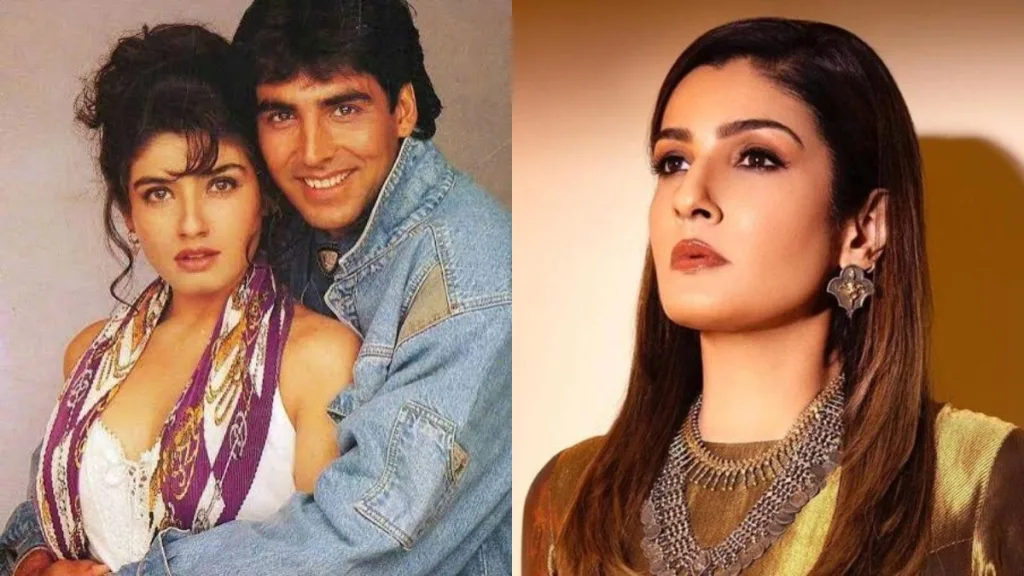Bollywood veteran Raveena Tandon recently stirred renewed conversation when she addressed the persistence of public fascination around her broken engagement with fellow actor Akshay Kumar—more than three decades after the event. In a candid podcast interview, Tandon briskly questioned why one disengagement continues to attract attention, especially when the very relationships that replace them are often fleeting.
“When people still search about my engagement with Akshay, I wondered, ‘Forgotten it a long time ago,’” Raveena said, referencing the headlining query she received about the 1990s split. She went on, “We made one hit film together, sure. But girls change their boyfriends every week in college, people get divorced, move on. Yet one broken engagement remains stuck to my name. Don’t know why.”
Her tone reflected a mix of bemusement and mild frustration. It’s a reminder of how old narratives linger in public memory—and how some celebrities feel trapped by them. For Raveena—now married to distributor Anil Thadani since 2004 and mother to teenage children—the past engagement feels distant, yet it keeps resurfacing, tethering her identity to a moment no longer relevant.
The engagement to Akshay stemmed from a period when the pair starred in chart-buster films like Mohra, and the cinematic pairing fed speculation of an off-screen romance. The trenchant memory of that era continues to cast a long shadow, even as both actors have charted their own courses since. But for Raveena, the attention feels unfairly fixed.
“I stopped reading anything written about it—why would I raise my blood pressure? If it’s just noise, better not read,” she remarked. The comment suggests fatigue with being asked the same question—a remarkable pressure considering she has had two marriages since and more than 25 years of post-engagement life. Yet just one headline forms the permutation the public returns to.
What makes this moment significant is how it underscores the nature of celebrity in India. The cultural expectation that past relationships remain repeatedly revisited—especially for women—is itself telling. Raveena’s pointed observation that “girls change their boyfriends every week” works as both sharp commentary and social critique. The underlying complaint: the endurance of outdated narratives—and the unequal scrutiny tied to them.
Interestingly, the episode also carries career undertones. Raveena’s resurgence in screen visibility—spurred by recent film announcements and renewed public interest—comes at a moment when her past relationship once again bubbles to the surface. For many stars, public interest in personal history enacts a dual function: distraction and brand-refresh. Whether intentionally leveraged or not, the resurfacing of past links often aligns with renewed professional footsteps. In her case, the new film Welcome to the Jungle sees her sharing screen space with Akshay once more—circling back to that earlier era.
From a broader lens, Raveena’s commentary invites a rethink of celebrity memory: why does one event remain in public loops when entire decades of life have passed? Why are some partnerships immortalised in headlines, while others fade? And crucially, why does the inquiry persist more insistently for female stars? The lingering question seems not just personal but systemic.
Her remarks also reflect an evolution in how stars engage with their narratives. While earlier generations might have ducked such topics, today’s stars—especially women with longevity in the field—are more direct about what they see as unfair. Tandon’s blunt response signals that she won’t continue to bear the coverage costs of an ancient headline just because it sells clicks.
For fans and media consumers, this moment offers a fresh prompt: when we dig out old relationship stories, what exactly are we looking for? Nostalgia, scandal, certainty? Raveena’s sharp defence suggests we should ask whether the story still holds meaning—or merely fills column inches.
Ultimately, the actress’s reflection is less about relational history and more about agency. It’s a claim, in so many words: “I moved on. You moved on. Why can’t you?” In that, she signals a shift. Celebrity isn’t just about what happens on screen—it’s also about when you’re permitted to stop answering for it.
In the end, Raveena Tandon’s voice sounds confident—not defensive. She’s not rewriting history; she’s asking us to reconsider why we re-read it. And in doing so, she reminds us that storytelling, especially celebrity storytelling, is as much about letting go as it is about looking back.

